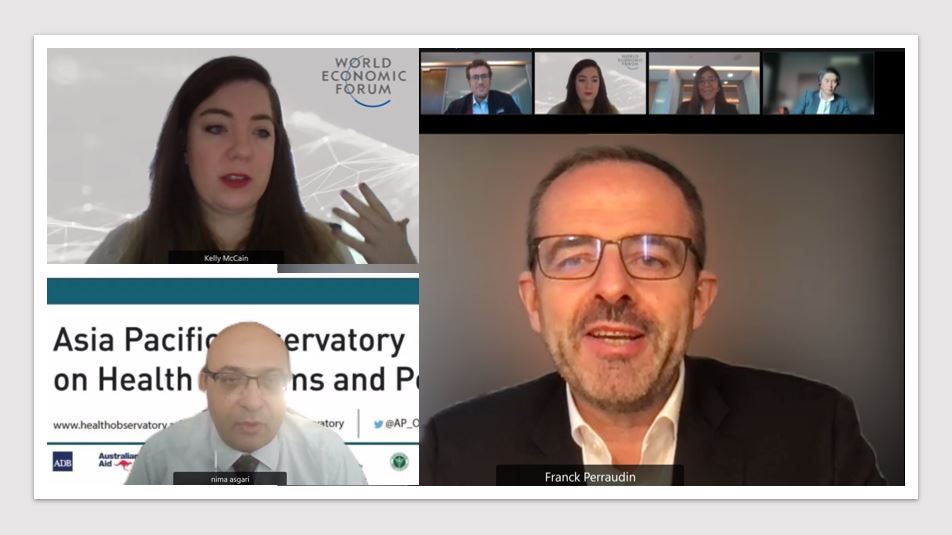News & Trends - Pharmaceuticals
Sanofi partners with World Economic Forum and KPMG to unveil new model of healthcare delivery and financing in APAC

Pharma News: Asia Pacific is home to approximately 60% of the world’s population where its diverse make-up presents challenges to healthcare systems across the region, especially at a pivotal time when patients are increasingly demanding more personalised care.
There are existing challenges that will continue to place a burden on healthcare systems such as ageing populations, rise in non-communicable diseases, and the need to create greater access to healthcare.
In response, KPMG in Singapore and Sanofi, with the support of the World Economic Forum, have gathered insights across APAC, including Australia, on the topic of sustainable healthcare delivery and financing. This has formed the ‘Universal Health Coverage (UHC) 2.0’ report with new insights and country-specific recommendations to inform the path forward for three major challenges – life-course immunisation, diabetes management and rare diseases.
Kelly McCain, Head of Healthcare Initiatives, World Economic Forum joined a panel in discussing the relevance of the report findings in shifting the current health system to a new model of care. “The pace of change is rapidly accelerating as a result of COVID-19 and this is creating an eminent need to rethink and redesign our [health] systems. Even the most innovative governments, businesses and community groups cannot solve some of these gigantic challenges in silos. The only way that we are going to accelerate change is to bring these disparate groups together from different sectors to share ideas, to exchange learnings and aggregate efforts to move things along faster.”
Franck Perraudin, Head of Global Health Partnerships and Alliances, Sanofi added “Health budgets are instilled under tremendous economic pressure and there are probably three sources to that pressure; the availability of finite public funds, the significant pace of innovation that the industry is bringing forward and the perception that health is a cost instead of an investment.
“We need to realise that investing in health is a positive step for the population, and it is not a cost. That’s probably one of the positive collateral effects of the COVID crisis. We need to switch the conversation from cost analysis to an investment and therefore the creation of financial products like social impact bonds or other vehicles can help support the effort.
“We believe there will be a need for enhanced conversations. Our company is ready to engage with government, insurers and patient groups to define what will make the health system sustainable for the future.”
Dr Nima Asgari, Director, APAC Observatory on Healthy Systems and Policies, World Health Organisation commented “What I find challenging is that the idea of equity, which is so fundamental to universal health coverage is not mentioned in the report. That to me is the backbone and I think we need to highlight this.
“We also know that the top 10 most expensive medicines, per treatment, are for the treatment of rare diseases where it’s not unusual to see $300,000 per year per patient. We are acknowledging that there is a need to increase financing and make it sustainable. We also must balance that against the wide gamut of potential new diseases that are treatable to see whether the treatments become cost effective. [Regulatory] institutions play an objective role in identifying whether the cost is worthwhile for the society as the totality of the money in the society is fixed.”
Eugene Hong, Executive Director, Head Pharmaceuticals and Healthcare at DBS Bank, Singapore said “It’s fairly unusual that a bank would be involved when it comes to healthcare. The DBS bank has actually taken a very targeted approach in focussing on healthcare because we see a growing trend and growing industry.
“The new models of healthcare are moving to a more virtual world. You need someone that will be able to provide that assurance that healthcare will be funded one way or another – by insurance, people, or governments. Governments have run out of significant funds in battling COVID and will need the private sector to step in, like the banks.
“We’re probably going to see a lot more public-private collaborations (PPPs), with hospitals being built by private enterprise. One of the leaders in this area is actually Australia, where we have done such funding.”
Hong also discussed the role of banks in helping patients with treatment costs for rare diseases by introducing self-funded instalment plans as there is a low level of access to government funded treatments due to the significant investment required per patient.
An important consideration, which the comprehensive report did not expand on, is the voice of the patient on this journey from UHC 1.0 to UHC 2.0. How do we shift patient involvement so it becomes an equal and collaborative engagement in healthcare and policy decision-making instead of being an afterthought? How will patients be invited to the table so that we can learn from their collectives experiences and be able to co-design for the future of healthcare delivery?
Digital & Innovation

Medical drone to reduce health equity gaps in rural and remote Australia
A specialised medical drone which increases accessibility to essential health services such as pathology, medicines, and telehealth services in rural […]
MoreNews & Trends - Pharmaceuticals

We’ve spent more on healthcare, but it’s been worth it
Healthcare expenditure is surging, with Australia now allocating approximately one-tenth of its budget to this sector. This financial uptick prompts […]
MoreNews & Trends - Pharmaceuticals

New partnership to raise the bar in precision oncology in Queensland
Pharma News: The Australian Translational Genomics Centre (ATGC) is teaming up with non-profit research organisation Omico and the PrOSPeCT program […]
MoreNews & Trends - Biotechnology

AusBiotech appoints new CEO: Former Sanofi corporate affairs and sustainability leader takes the helm
Biotech News: AusBiotech, the nation’s leading industry body for the biotech sector, has named former leader at Sanofi, Rebekah Cassidy, […]
More